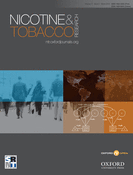-
Views
-
Cite
Cite
Kelly C. Young-Wolff, Norval J. Hickman, Romina Kim, Kathleen Gali, Judith J. Prochaska, Correlates and Prevalence of Menthol Cigarette Use Among Adults With Serious Mental Illness, Nicotine & Tobacco Research, Volume 17, Issue 3, March 2015, Pages 285–291, https://doi.org/10.1093/ntr/ntu141
Close - Share Icon Share
Abstract
With a focus on protecting vulnerable groups from initiating and continuing tobacco use, the FDA has been considering the regulation of menthol in cigarettes. Using a large sample of adult smokers with serious mental illness (SMI) in the San Francisco Bay Area, we examined demographic and clinical correlates of menthol use, and we compared the prevalence of menthol use among our study participants to that of adult smokers in the general population in California.
Adult smokers with SMI (N = 1,042) were recruited from 7 acute inpatient psychiatric units in the San Francisco Bay Area. Demographic, tobacco, and clinical correlates of menthol use were examined with bivariate and multivariate logistic regression analyses, and prevalence of menthol use was compared within racial/ethnic groups to California population estimates from the 2008–2011 National Survey on Drug Use and Health.
A sample majority (57%) reported smoking menthol cigarettes. Multivariate logistic regression analyses indicated that adult smokers with SMI who were younger, who had racial/ethnic minority status, who had fewer perceived interpersonal problems, and who had greater psychotic symptoms also had a significantly greater likelihood of menthol use. Smokers with SMI had a higher prevalence of menthol use relative to the general population in California overall (24%).
Individuals with SMI—particularly those who are younger, have racial/ethnic minority status, and have been diagnosed with a psychotic disorder—are vulnerable to menthol cigarette use. FDA regulation of menthol may prevent initiation and may encourage cessation among smokers with SMI.






Comments